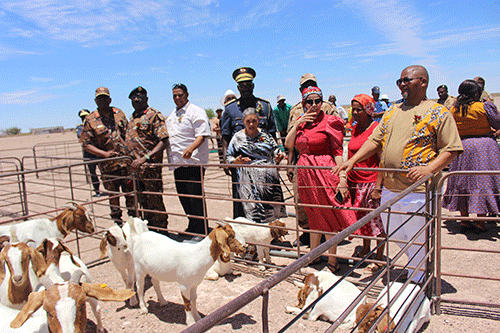ν Steven Klukowski
BERSEBA -//Kharas regional governor Aletha Frederick has hailed the positive impact and growing influence of the recent Berseba goat expo, which saw southern farmers showcase their animals and other products.
Frederick highlighted that the expo, which this year marked the third edition, again provided a unique opportunity for local farmers to showcase their livestock and hard work, with a particular focus on the various goat breeds and the role they play in sustaining the livelihoods of rural communities of the region.
“The Berseba goat expo holds immense significance as it aims to promote and revitalise the rural and peri-urban economies of the Berseba constituency. From an economic perspective, goats offer multiple income streams for our farmers by providing a source of nutritious milk and meat that can be consumed or sold locally,” Frederick said.
The governor was also impressed with how the farmers turned up for the event and how serious they take the event, saying organisers should continue to ensure farmers are taught about the latest and most sustainable agricultural practices so that they can contribute to the growth of national economy.
“We understand that events such as the Berseba goat expo does not only provide a platform for showcasing local products but also foster networking opportunities, knowledge sharing, and capacity building within our agricultural sector. I want to encourage all participants to make the most out of this expo by engaging in meaningful discussions, exploring potential partnerships, and learning from each other’s experiences.”
Meanwhile, Berseba Village Council chairperson Felicia Motinga said more recognition and support should be accorded to upcoming and existing women farmers, especially those in the goat industry.
“We should encourage our women to become active goat farmers. We must invite training experts in the goat farming industry and financial backers like Agribank to come on board and assist these farmers,” she stressed.
Also speaking at the expo was Berseba constituency councillor Jeremias Goeieman, who said that: “Goat farming should not only be limited to the selling of meat for local consumption, but farmers should also be trained on how to capitalise maximally on their animals through value addition, like producing garments from goat hides and so forth,” he emphasised.
For most southern farmers, goats have proven to be highly adaptable and resilient animals that can thrive in harsh environments with limited resources, which makes them an asset for farmers who face perennial drought conditions.
Unlike other livestock species, goats have a lower water requirement due to their physiological adaptations. They can survive on lower-quality fodder and browse vegetation, which allows them to graze on a wider range of plants, including those that are drought-tolerant or resistant.
Those unique characteristics and abilities contribute to their significance in promoting sustainable agriculture practices and ensuring food security in these challenging circumstances.



